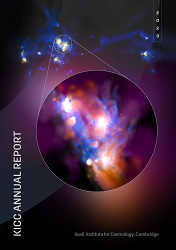
Submitted by S. Brereton on Wed, 21/06/2023 - 10:10
Two areas of KICC research stand to benefit from UKRI investment upgrading UK research infrastructure
£72 million funding includes
- £6.8 million to scope a second-generation instrumentation suite for the European Southern Observatory’s Extremely Large Telescope
- An £8 million investment in the conceptual design of new technologies for next-generation gravitational wave infrastructure
UK ELT: The next generation instrumentation suite for the Extremely Large Telescope
The European Southern Observatory’s (ESO) Extremely Large Telescope, currently under construction in the Atacama Desert in Chile, will be the largest visible and infrared light telescope in the world.
It will explore the early universe and other worlds in unprecedented detail and provide clearer observations of cosmic objects than ever before. The UK is one of 16 ESO member states funding the construction of the state-of-the-art telescope. UKRI is investing £6.8 million in a scoping project to enable essential design and development work to deliver the full instrumentation suite for the ELT, which will allow scientists to analyse data collected by the telescope and fully utilise the power of this ground-breaking new facility.
Further details of KICC involvement in this project can be found at
https://www.kicc.cam.ac.uk/projects/andes
https://www.kicc.cam.ac.uk/projects/eelt
KICC's Roberto Maiolino and Martin Haehnelt are the ANDES Project scientist and UK board member, respectively.
Next-gen GW: The next generation gravitational wave infrastructure
Gravitational wave observatories measure tiny distortions in spacetime called gravitational waves (GW). It is a radical way of observing astronomical objects, like black holes, that cannot be studied with traditional telescopes.
UKRI is investing £8 million in the conceptual design of instrumentational and computational technologies to enable UK leadership in next-generation GW infrastructure.
Cambridge has had a long-standing engagement at the frontline of gravitational wave research, participating with its local research group in the LIGO-Virgo-KAGRA Collaboration. Being a founding member of the AION project in the UK [2] and the newly formed Einstein Telescope Collaboration [3] and through its contribution to scientific studies for the Cosmic Explorer [4] and LISA [5], Cambridge will continue its rôle in driving the field forward, into the exciting Next-Gen era of gravitational wave detectors.
[1] https://www.ligo.org
[2] https://aion-project.web.cern.ch
[3] https://www.et-gw.eu
[4] https://cosmicexplorer.org
[5] https://www.lisamission.org/
Further details of the investments in these and other projects can be found here


